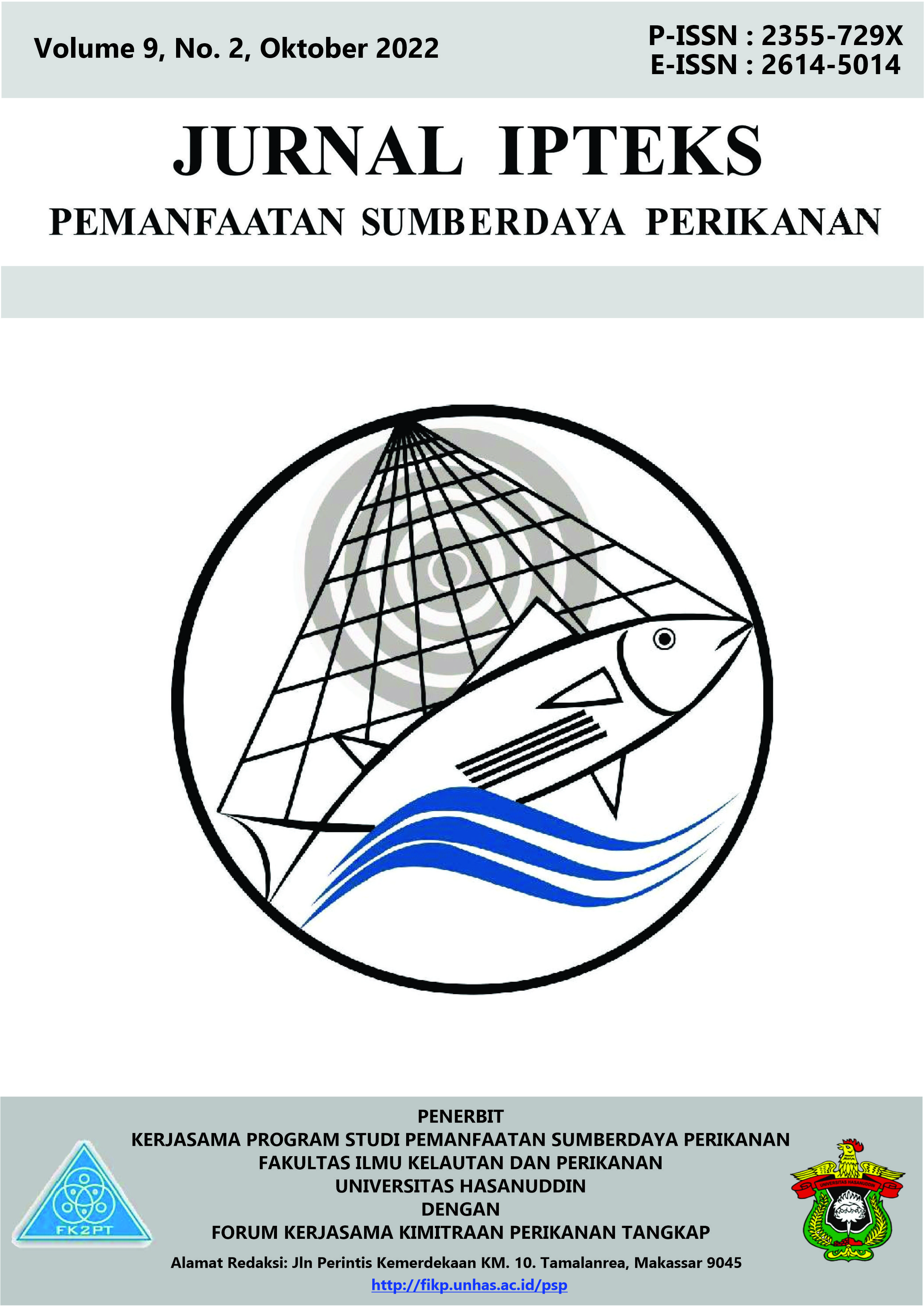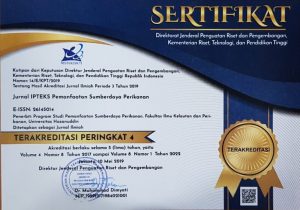SOCIAL ECONOMIC ANALYSIS OF ILLEGAL FISHING FISHERS IN SPERMONDE ISLAND
DOI:
https://doi.org/10.20956/jipsp.v9i2.23772Keywords:
Illegal Fishing, Islands, Fishermen, Spermonde, Socio-EconomicAbstract
The sustainable use of fish resources is closely related to fishing practices by fishermen. It is a classic problem that utilizing marine and fishery resources, the exploitation method carried out by fishermen often does not consider environmental sustainability aspects or is contrary to the principles of responsible fisheries management (Code of Conduct for Responsible Fisheries - CCRF). This study aims to examine IUU fishing activities from the socio-economic dimension, which under certain conditions will produce its own understanding, especially when it comes to traditional rights, resource share allocation, and the level of dependence on fishery resources. The type of research is qualitative research with a case study method. Data collection techniques are observation, interviews, and literature study. The data collected includes primary data and secondary data. The data analysis technique used is the content analysis method through the stages of data reduction, data presentation, and drawing conclusions. The results of this study indicate that illegal fishing that occurs in the Spermonde Islands is dominant due to the pressure to fulfill economic needs, other factors are the low understanding of the importance of sustainable use of fishery resources; increasing demand for foreign markets, especially live fish; and inconsistency and weak law enforcement in preventing the use of explosives and drugs. Empirical data on resource potential is required and integrated into policy formulation in the form of responsible fisheries, including other activities that can be done by fishermen as alternative livelihoods, and ecosystem approaches for conservation and management of fish stocks of related species.
References
Arief, AA (2021). Small Island Fishermen and Capitalism. Yogyakarta : Depublish.
Arief, AA, & Agusanty. (2021). Fishermen An Economic Sociology Review. Yogyakarta : Depublish.
Arief, AA, Agusanty, H., & Mustafa, MD (2020). Fishermen Conflict and the Resolution for Using Fisheries Resources Utilization at Selayar Islands, South Sulawesi. ECSOFiM (Economic and Social of Fisheries and Marine Journal), 7(2), 228–238.
Berkes, F. 1996. Social Systems, Ecological Systems, and Property Rights. In Hanna, SS, Folke, and KG, Maler (Eds). Right to Nature: Ecological, economic, cultural, and political principles of institutions for the environment. Beijer, Island Press.87-107.
Christy, FT 1982. Territorial Use Rights in Marine Fisheries: Definitions and conditions. FAO Fish. Tech. Papers. 277:10pp.
Goodstein, ES 1999. Economics and the Environment. Second Edition. Prentice Hall, New Jersey. 558p.
Graham, T, and N. Idechong. 1998. Reconciling Customary and Constitutional Law: Managing Marine Resources in Palau, Micronesia. In K. Ruddle (Ed.). Special Issue on A Modern Role for Traditional Coastal Marine Resource Management Systems in the Pacific Islands. Ocean & Coastal Management. Vol. 40. No.2-3:143-164.
Hanna, S. S, C. Folke, and K. G. Maler. 1995. Property Rights and the Natural Environment. In SS Hanna, C. Folke, and K. Goran Maler. Rights to Nature: Ecological, Economic, Cultural, and Political Principles of the Institutions for the Environment. Island Press. 1-10.
Hardin, G. 1998. Extensions of The Tragedy of the Commons. Science 280 (5364): 682..
Johannes, RE 1981. Working with Fishermen to Improve Coastal Tropical Fisheries and Resources Management. Bulls. of Marine Science, 31(3).
Kusnadi, 1998. The Increase of Marine Resource Exploitation. Kompas, the national newspaper.Http://www.kompas.com/9802/17/ Opinion/men.htm
Li, TM 1996. Images of Community: Discourse and Strategy in Property Relations. Development and Change. Vol. 27 Number 3. July 1996: 501-527.
Mantjoro, E., 1996a. Management of Traditional Common Fishing Ground: The experience of the Para community, Indonesia. Coastal Management, 24:229-250.
Mantjoro, E., 1996b. Traditional Management of Communal-Property Resources: The practice of the Sasi system. Ocean & Coastal Management Vol. 32. No. 1. Elsevier Science. Ltd. pp. 17-37.
Miles, MB, Huberman, AM, and Saldana, J. (2014). Qualitative Data Analysis, A Methods Sourcebook, Edition 3. USA: Sage Publications.
Munyi, F. (2009). The Social and Economic Dimensions of Destructive Fishing Activities in the South coast of Kenya.
Nurdin, N., & Grydehøj, A. (2014). Informal governance through patron–client relationships and destructive fishing in Spermonde Archipelago, Indonesia. Journal of Marine and Island Cultures, 3(2), 54–59.
Saad, S. 1998. Fishermen Empowerment Strategy. Kompas, The national newspaper.Http://www.kompas.com/9802 /24/opini/stra.htm.
Saad, S. 2000. The Right of Retention and Fishing: Existence and Prospects of Its Regulation in Indonesia. Gadjah Mada University, 2000. Ph.D Dissertation.
Saad, S. 2001. Decentralization of Marine Territory Management. Decentralization of Coastal Areas. In S. Saad, M. Hasbi, and Awaluddin (Eds). Decentralization of Coastal Resources Management. Proceedings of Regional Workshop of Sulawesi Island. Makassar, 12-14 March 2001. Partnership for Government Reform – Elsap. 277 – 280.
Silva, P. (2006). Exploring the linkages between poverty, marine protected area management, and the use of destructive fishing gear in Tanzania. World Bank Policy Research Working Paper, 3831.
Taufiq, TT (2018). Religion-Based Environmental Wisdom (Ethnoecological Study of Fisherman Community in Banyutowo Coastal, Dukuhseti Pati). Journal of the Sociology of Religion, 11(2), 259–280
Stice. 2010. Akuntansi Keuangan. Edisi 16. Jakarta: Salemba Empat.
Suratiyah, K. 2015. Ilmu Usaha Tani. Jakarta: Penebar Swadaya.
Undang-Undang Republik Indonesia. Nomor 16 Tahun 1964 Tentang Bagi Hasil Perikanan. Sekretariat Negara Republik Indonesia.
Undang-Undang Republik Indonesia Nomor 13 Tahun 2003 Tentang Ketenagakerjaan. Sekretariat Negara Republik Indonesia.
Usman, S. 2004. Pembangunan dan Pemberdayaan Masyarakat. Yogyakarta: Pustaka Pelajar.
Downloads
Published
How to Cite
Issue
Section
License
Copyright (c) 2022 Jurnal IPTEKS Pemanfaatan Sumberdaya Perikanan

This work is licensed under a Creative Commons Attribution 4.0 International License.














